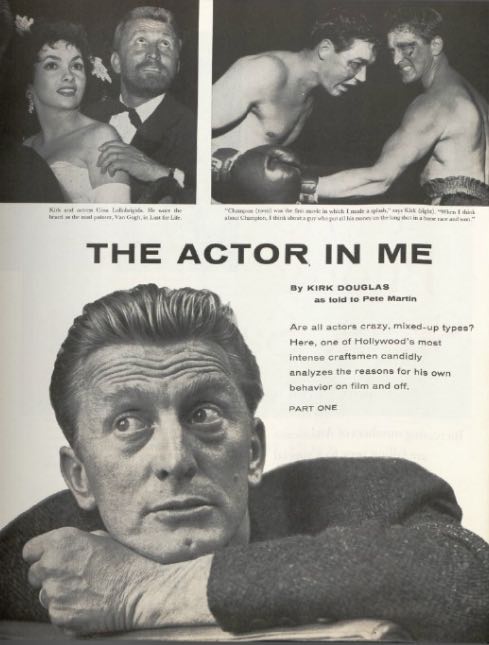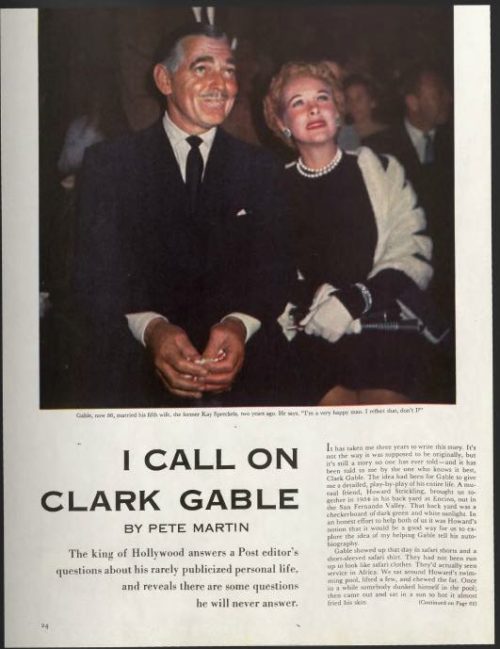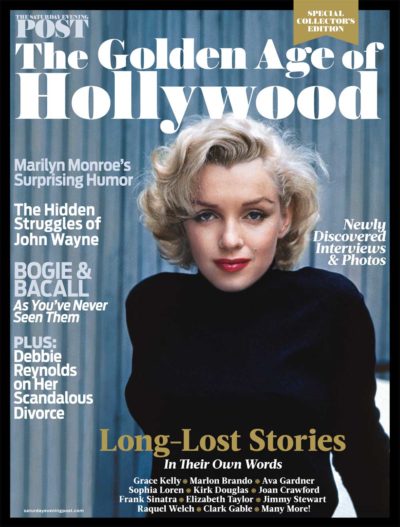Leading Men of Hollywood: Kirk Douglas
This is an abridged version of two articles written by Kirk Douglas with Pete Martin, which appeared in the in the June 22 and June 29, 1957, issues of The Saturday Evening Post. You can read the complete original article in the flipbook, below.
This article and other features about the stars of Tinseltown can be found in the Post’s Special Collector’s Edition, The Golden Age of Hollywood. This edition can be ordered here.
Apparently the public takes it for granted that if you’re a successful actor, you must be a schmoe. There’s nothing like scoring a hit to make people hunt for new, unpleasant traits in your character. Searching for them, they discover them whether they’re there or not. Then they say, “What did I tell you? He’s changed.”
Usually the change is in other people, not the actor. As a raw newcomer to Hollywood, I had trouble getting a table in the swankier local restaurants. Now I can get a table most of the time, although I don’t deserve it any more than I did 10 years ago. What has changed is not me but the attitude of the headwaiters toward me.
The first movie in which I made a splash was Champion. After I appeared in it, I was told by a woman columnist, “You’ve changed. Now you’re sexy.”
A writer told me: “Making a hit in Champion changed your personality. I don’t like you now.”
“I haven’t changed,” I told him. “I was an s.o.b. before I did Champion and I’m still an s.o.b., only I was too unimportant for you to notice it before.”
I think that I’m still the way I was before Champion. I didn’t kowtow to producers then; I’m not noted for it now. Even when I was a bum, standing in line on the Bowery to buy a cheap Salvation Army meal, I didn’t buddy up to people I thought were jerks, no matter how much good they could do me. This is not always the accepted way to get ahead. Too often in the entertainment field, the idea persists that you can ignore influential creeps only after you have become successful.
Nowadays when I go back to my hometown, Amsterdam, New York, everybody there takes it for granted that I must have an ego the size of a weather balloon. People in Amsterdam ask me, “Do you remember when we did so-and-so?” and when I say, “Sure, I remember,” they’re amazed.
“What do you know!” they exclaim. “Kirk remembers.”
I want to ask them, “If you remember little things that happened around you. How many people are doing what they want to do? Yet no one ever hit an actor over the head to make him become an actor. You’re an actor because that’s what you want to be, despite all the difficulties.
An actor’s need to project his emotions from his insides to his outside sandpapers his nerves. His feelings lie so close to the surface that such terms as “crazy” and “mixed up” are often applied to him.
My friend, producer-director Billy Wilder, gives me the berry for hankering to play every good role Hollywood offers. He says, “Kirk gives you all he’s got. His chest begins to heave even before a director snaps his fingers. He doesn’t need violins playing in a corner to put him in the right mood.” I hope he’s right. If he means that I enjoy acting, he is right.
There’s another thing about actors — every one of them wants to play each role he’s given better than it’s humanly possible for him to play it. I not only want to achieve perfection in each role I play, I want to play all the good roles there are to play. It’s absurd to feel this way, but it makes me unhappy that I can’t be starring in my next picture, The Viking, and playing two other top roles at the same time.
I’ll always believe that there’s value in being willing to work like a horse to do a better job. Until I played the prize fighter in Champion, I had never boxed at all. When I started work in Champion, I had three left hands, none of which could jab or throw a punch, but I trained in a gym until I became a passable fighter.
It could be that my willingness to work long and hard to master a new skill is just another manifestation of my desire to create a sensation with an unexpected accomplishment; then throw it away by saying, “It’s really nothing.” But I honestly don’t think that’s it. It’s not so much exhibitionism on my part as a need to believe in those games of “Let’s pretend.” If I believe in them hard enough, moviegoers may believe in them too.
The Truth
I’m the kind of actor I am because in a few small, important ways I am still the boy named Issur Danielovitch who lived near the carpet mills in Amsterdam, New York. If an actor lets himself become blasé, he can’t play the game of let’s pretend, which is the essence of being an actor. He’s lost if he says to himself, “What am I doing here, a grown man, pretending I’m a cowboy? This is ridiculous.”
If you can’t pretend without being self-conscious, if you begin to think, Get me, everybody. I’m an actor, and I’m acting the pants off of this role. You’ll end up by thinking of yourself as a star with a capital S, and you will be a flop with a capital F.
Perhaps I’ve dwelt too long on the odd traits of actors; they have virtues too. The most generous people I’ve ever dealt with are actors and newspapermen. Pass the hat for a needy co-worker in either group and you’d better have a big hat. And no one is willing to work harder than an actor—to the end of his endurance, if need be. This goes for any actor, famous or obscure.
My agent once said of me, “Kirk is always riding me to put out more effort on his behalf. I spend more time on him than I do on any other two stars on my list, so in a way he’s more trouble to me than he’s worth. But it’s only fair to say that the guy drives himself harder than he drives me. ‘Hey, Douglas,’ he tells himself. ‘Do something. Get going! Get off the dime!’”
Whatever drive I have stems from lessons learned a long time ago. When I was working my way through St. Lawrence University, I once lost my small fund of cash in a poker game. Much ashamed, I had to go home to my hard-pressed mother and tell her.
“You are such a fool,” she chided me. “You bet money on cards. What do the cards know about you? What do they care?” She gave me a hug and said, “Everyone likes to gamble. There’s nothing wrong with gambling. You want to bet? O.K., bet. But gamble on yourself.”
I have found that the perfect place to take her advice is in acting. I’ve never hesitated to gamble for really big stakes—abandoning my contract at Warner’s, starting my own independent company, Bryna Productions. I’ve been lucky enough to make a few good pictures, but I don’t assume that I’ll never boot one. No one bats a thousand in any league, and a champ is a guy who walks into the ring one day and gets clobbered by a kid no one ever heard of. All I can do is work as hard as I know how, and, when the chips are down, gamble on myself.

This article and other features about the stars of Tinseltown can be found in the Post’s Special Collector’s Edition, The Golden Age of Hollywood. This edition can be ordered here.
Leading Men of Hollywood: Clark Gable
This article was originally published in the Post on October 5, 1957. This and other features about the stars of Tinseltown can be found in the Post’s Special Collector’s Edition, The Golden Age of Hollywood, which can be ordered here.
My wife, Kay, is stopping by at 3 o’clock to pick me up,” Clark Gable told me when he walked into my hotel room for our interview. “You ask me questions, and I’ll tell you the truth. If you ask me something too personal, I’ll say, ‘that’s a question I don’t care to answer; I’m keeping that to myself.’ But if you ask me something that I feel I can answer honestly, I will.”
After I’d tried unsuccessfully to ask him a few personal questions, I asked him about three pictures he’d been in: IT HAPPENED ONE NIGHT, MUTINY ON THE BOUNTY and GONE WITH THE WIND. “I’ve heard you wanted to be in none of them,” I said, “but in each case somebody talked you into changing your mind.”
“IT HAPPENED ONE NIGHT came along early in my motion-picture career,” he said. “For two years after M-G-M put me under contract, I pulled guns on people or hit women in the face. Then M-G-M assigned me to a bad part in DANCING LADY, with Joan Crawford—a picture I didn’t like. But as bad as the part was, it wasn’t as bad as my health.”
“What was wrong with you?” I asked.
“I’d lost a lot of weight. They’d been working me hard, and I was tired. I told myself, ‘If I have a few operations, that will take care of my health and the part in DANCING LADY too.’ I had my appendix and my tonsils out, but it didn’t take care of everything, for M-G-M was mad at me. For some strange reason they thought I’d taken evasive action to avoid their picture. They bided their time during the eight or nine weeks I was in the hospital. Then the very day after I got out they called me in and said, ‘We’re sending you over to Columbia Pictures on a loan-out.’”
“Was that punishment?” I asked.
“At that time Columbia was on the wrong side of the tracks,” Gable said, “and being sent there was a this-will-teach-you-a-lesson deal. I didn’t know anybody at Columbia, but I’d been told, ‘Report to Frank Capra,’ so I reported to him.
“Frank is a nice guy, and he was tolerant of my attitude, which, to put it mildly, wasn’t good. He didn’t know I felt that I had just been swept out of M-G-M’s executive offices with the morning’s trash. I took home the script of IT HAPPENED ONE NIGHT, and I read it. I had a couple of drinks and thought, It can’t be that good. I’d better look at it later. So I had dinner and read it again. It was still good. The next morning, I called Frank and said, ‘I want to apologize for my behavior yesterday. I was rude, and I had no reason to be. You’ve got a fine script. Why you’ve chosen me to be in it I don’t know. You’ve never seen me play comedy on the screen.’”
“Did he ever tell you why he chose you,” I asked.
“I don’t know to this day,” Gable said. “I told him, ‘If you think I can do it, I’ll try, but after three or four days, if you don’t like what you see on the screen, you can call the whole thing o and there’ll be no hard feelings.’ We worked a few days; Frank came to me and said, ‘We’ll have no trouble.’”
In the end, the lm’s female star, Claudette Colbert, and Gable himself won Academy Awards for the year’s best performance by an actress and actor. The picture itself won the award as the outstanding production of 1934. Capra won an Oscar for his direction. Writer Bob Riskin won a similar award for the year’s best screenplay.
Other Roles Nearly Missed
“I didn’t want to be in the second picture you mentioned, MUTINY ON THE BOUNTY, because it was a story about
a crew of Englishmen, and since I obviously wasn’t English, I felt I was badly miscast.
“For a while there was a deadlock. It was broken by Kate Corbaley, who headed M-G-M’s story department. God rest her soul—she’s dead now—but she was a wonderfully kind, white-haired, brilliant woman. She knew I was giving Irving [Thalberg, one of the film’s producers,] a bad time, and she didn’t like civil war in the studio, so she came to me and said, ‘I think you’re making a mistake. I’ve read this story, and I can’t see anybody else playing Fletcher Christian but you.’
“‘Not me, Kate,’ I said stubbornly. “I’d have to wear knee britches and a three-cornered hat. That’s more than I can stomach.’
“‘Don’t be such a mule,’ she told me. ‘Listen.’ So I listened, and after I listened, I said, ‘O.K., let’s go,’ although I still didn’t like it.”
“Did you feel better about it as you went along?” I asked.
“Not me,” he said. “I told everybody who’d listen, ‘I stink in it.’ I didn’t realize I was wrong for several months. But after the studio previewed MUTINY, I got a cablegram from Thalberg: ‘The movie is wonderful. We’re proud of it. You’ll like yourself in it.’ I had to believe Irving because he was a guy you could believe. He didn’t kid himself or anybody else.”
“I don’t see how you could have avoided playing Rhett Butler in GONE WITH THE WIND,” I said. “The whole country cast you in it long before the cameras began to roll.”
“That was exactly the trouble,” Gable clarified. “Not only that but it seemed to me that the public’s casting of me was being guided by an elaborate publicity campaign.”
I disagreed. “That casting was a natural thing,” I said. “No studio or producer controlled it. I sat in any number of bull sessions in friends’ homes while we cast that picture. Nobody said we ought to cast it; we just did. And the way we nonmovie employees cast it was the way it was eventually cast on the screen. Almost everybody agreed on you as Rhett Butler, Leslie Howard as Ashley and Olivia DeHaviland as Melanie.”
“My thinking about it was this,” Gable told me, “that novel was one of the all-time best sellers. People didn’t just read the book; they lived it. They visualized its characters, and they formed passionate convictions about them in their minds. You say a lot of people thought I ought to play Rhett Butler, but I didn’t know how many had formed that opinion.”
“Enough,” I said.
“There are never enough,” he told me. “But one thing was certain: They had a preconceived idea of the kind of Rhett Butler they were going to see, and suppose I came up empty?”
I’d never heard that phrase before, so he explained, “I thought, All of them have already played Rhett in their minds; suppose I don’t come up with what they already have me doing. Then I’m in trouble. If they saw one thing I did that didn’t agree with their remembrance of the book, they’d howl. I’d done the same thing when I’d wanted to be a Shakespearean actor. I’d taken a copy of HAMLET or RICHARD II or OTHELLO to the theater with me, and I’d checked on the Shakespearean actors. I’d say, ‘Why that — missed an “and” or ‘He left out a “but.” He can’t do that.’”
“I’ve seen GONE WITH THE WIND three times,” I told him, “and I had the feeling you enjoyed it.”
“It was a challenge,” he said. “I enjoyed it from that point of view. But my chin was out to there. I knew what people expected of me and suppose I didn’t produce?”
“But you did produce,” I said.
“Maybe so,” he said noncommittally.
“When did you finally get it through your head you’d done all right?”
He said, “The night we opened in Atlanta, I said, ‘I guess this movie is in.’”
“How did you figure that?” I asked. “Did you enjoy it yourself or did you gauge it by other people’s reactions?”
“Other people’s reactions,” he said.
I said, “Have you ever considered retirement? What do you think about your future?”
“That’s a logical question, and I’ll give you a logical answer,” he said. “When the public doesn’t want me any longer, I’ll quit.”
“How will you know?” I asked.
“I don’t want to stay around long enough to bore people, and I won’t. They have their own way of expressing themselves, and unless an actor is looking the other way, he can see the warning. But as long as the people still go to see my films, I’ll do my best to entertain them.”

 This article and other features about the stars of Tinseltown can be found in the Post’s Special Collector’s Edition, The Golden Age of Hollywood, which can be ordered here.
This article and other features about the stars of Tinseltown can be found in the Post’s Special Collector’s Edition, The Golden Age of Hollywood, which can be ordered here.